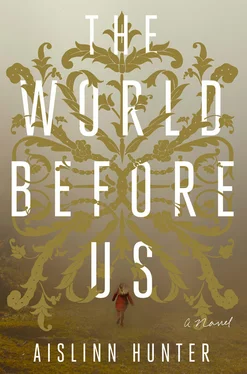Once, later, standing on a chair in Scarborough while Nora stitched a hem, she confessed that it was Norvill who had changed this, who had brought something inside her back to life.
Jane parks the Mercedes in the church parking lot and lets Sam out. Since she left the station she has been trying to imagine what sort of shape her wrongness might have taken; she has been playing at it as if it is a puzzle, removing one piece — William’s indifference — and replacing it with another — William’s possible concern — even as she knows that his concern isn’t, or ought not to be, the central part of the equation. This has led her to thoughts of Charlotte and Norvill, to what it is people are looking for in each other, and what, by extension, Jane is looking for in N. Prudence’s diaries — her disdain for Charlotte, for the headmaster George befriended, for the East, or for anything that might take her sons away from her — are making Jane rethink the contents of Charlotte’s diaries; though really it’s the gaps that interest her now. There were, after all, two hiatuses in Charlotte’s diaries that Jane hadn’t paid much attention to. These, she now understands, correspond to the trips Charlotte made to be with Norvill at the coast, trips that Edmund, in his defeat, likely permitted so long as his wife was discreet — although Jane imagines his compliance would have come without formal declaration.
It’s not improbable that he wanted his wife’s happiness after all. Not impossible that both times, she’d come back flushed and rejuvenated and, perversely, more in love with him. Perhaps, although the cost was high, seeing Charlotte’s spirit returned to her was a relief to Edmund — especially if she shared her renewal with him.
Jane hasn’t realized until now that those years of struggle for Charlotte and Edmund correspond to the years when the Chester museum was fully realized — when the collections that had been idling pleasantly alongside Edmund’s factories and family concerns were given almost everything he could offer in terms of money, attention and time. The clocks cleaned and working perfectly, the whale knit to the ceiling, the hummingbirds purchased, and the Vlasak plant specimens procured: each glassy piece a true correspondent to the animate thing it was modelled on, a marvel of petals, stems and leaves, the strawberry plant weighted with a glaze of frost — captured exactly as it might have been in the last brisk days of autumn.
The day of the picnic, Nora shifted from one foot to the other; she had yet to purchase a second pair of shoes and the sole of the left one had lost some of its stitching and was flapping annoyingly near the toe. She’d confided this to Charlotte, who had reluctantly allowed her to station herself at the slip between the alders where the Chester children had shouldered their way through, the shrub’s green leaves silvering while she waited. The conversations of the men, when they stood close enough for her to listen, were wonderful. Mr. Chester was telling Mr. and Mrs. Sutton about his museum, the rarities of nature he’d collected and seen. “The world is a large place,” Chester said, and he ran his hand over his vest, lightly fingering his pocket watch. “Though I suppose you know that.” He was speaking to the Suttons, but sensed Nora’s eyes on him and nodded in her direction. He said this last phrase looking at her face, as if he could discern a worldliness at work there.
When Leeson burst through the bushes, Nora was feeding Cato a bump of bread. The dog spun and Norvill appeared with a shotgun, and Nora did not have time to reach him. Leeson halted when he saw Norvill and the shot that stopped him again was loud and strangely flat, a burst that arced and tattered. Leeson’s arms swinging in a circle as he sought to right himself.
Nora’s face was above Leeson’s before George reached them, her hands cradling his head. And she was there when Norvill bent down and saw what he’d done. A flicker of understanding crossed Norvill’s countenance: he saw that Nora knew the man.
This is why it came as a surprise a month later when Prudence, taking her tea in the gazebo, announced that Norvill needed a maid for the house in Scarborough and that she had been requested. “The footman has no skills, he can barely mail a letter, and Norvill needs someone who can clean and cook , and take dictations related to his work; his hands are sore from the constant chiselling.” Prudence stood up and smoothed her skirt, her eyes welling because she preferred Nora to the others and because now that George had gone back to the Himalayas, the house was too quiet. That night, taking her tinctures, she confessed that Nora’s leaving would be difficult, that she was beginning to feel that she was alone in the whole of the world.
Norvill came to Inglewood a week later to visit his mother and to collect Nora. The day before their departure he put on a tweed jacket and announced that he was heading out to the main cave to make strati-graphical sketches; it would consume most of the afternoon should anyone — meaning Prudence — need him. In a moment of compassion, or perhaps with sudden awareness that he would need someone to assist him, he’d stopped and turned just before the French doors to ask Nora if she’d like to join him.
The entrance to the cave was a narrow slit at the base of a limestone cliff. Step into its darkness and you were suddenly in its throat: damp and dripping and hollow. There was almost an entry hall, Nora could sense it: a high sand-coloured vault framed by jagged columns that hung from the ceiling and rough balusters that sprung up from the ground. Nora lifted her hem and stepped over the puddle in the walkway. As she squeezed between two large mounds that looked like petrified mushrooms, Norvill chided her for not removing her bustle, held the lamp in each hand higher so that she could see where her skirt had caught. There were pools of water in the depressed regions of the warped floor and Norvill took her hand to guide her along the slippery wall. At the first intersection, dripping sounds came from three directions, a plik plonk plik that reminded her of the clocks in the small parlour. The world smelled of an absence of grass, an absence of green things.
In the cavern Norvill called “the Inverted Forest” he took his sketch pad out of his satchel, gave Nora one of the lamps and asked her to hold it against the wall she would find some twenty paces past where she was standing.
“Go slowly,” he cautioned, and just as he said so a large glinting tooth — what she could only conceive of as a giant incisor — appeared hanging from the roof of the cavern inches above her head. She lifted up the lamp and saw dozens, no, hundreds more.
Norvill stayed where he was, even though he could see she was frightened. He said, “It’s as if the trees stripped by winter have been strung upside down. That’s why we call it the Inverted Forest.”
“No,” she replied, even though she knew it was not her station, “it’s as if we are inside the mouth of that bear you have stuffed in your entry, and are about to be swallowed.”
What Nora didn’t tell Norvill, even as the years progressed and they fell into an easy affinity — he always treating her as help, though he gave her secretarial tasks and praised her liberally — was that she’d had a strange sensation in the cave in that hour when she was asked to hold the lamp up toward the lined and glittering wall behind her. She did not believe in spirits or ghosts, and she was not deceived by the mesmerizing theatrics she’d once seen Samuel Murray perform in a comedy for the Superintendent — the poet with black around his eyes and a gypsy scarf over his head, predicting everyone’s future in return for coins made of paper. No, what she felt instead was a kind of tenor — like on those rare days when a shift in the weather or a word dropped by a stranger recalls you to some other time, to how you felt or where you once stood or what work you were doing; recalls you to the person you were then.
Читать дальше












